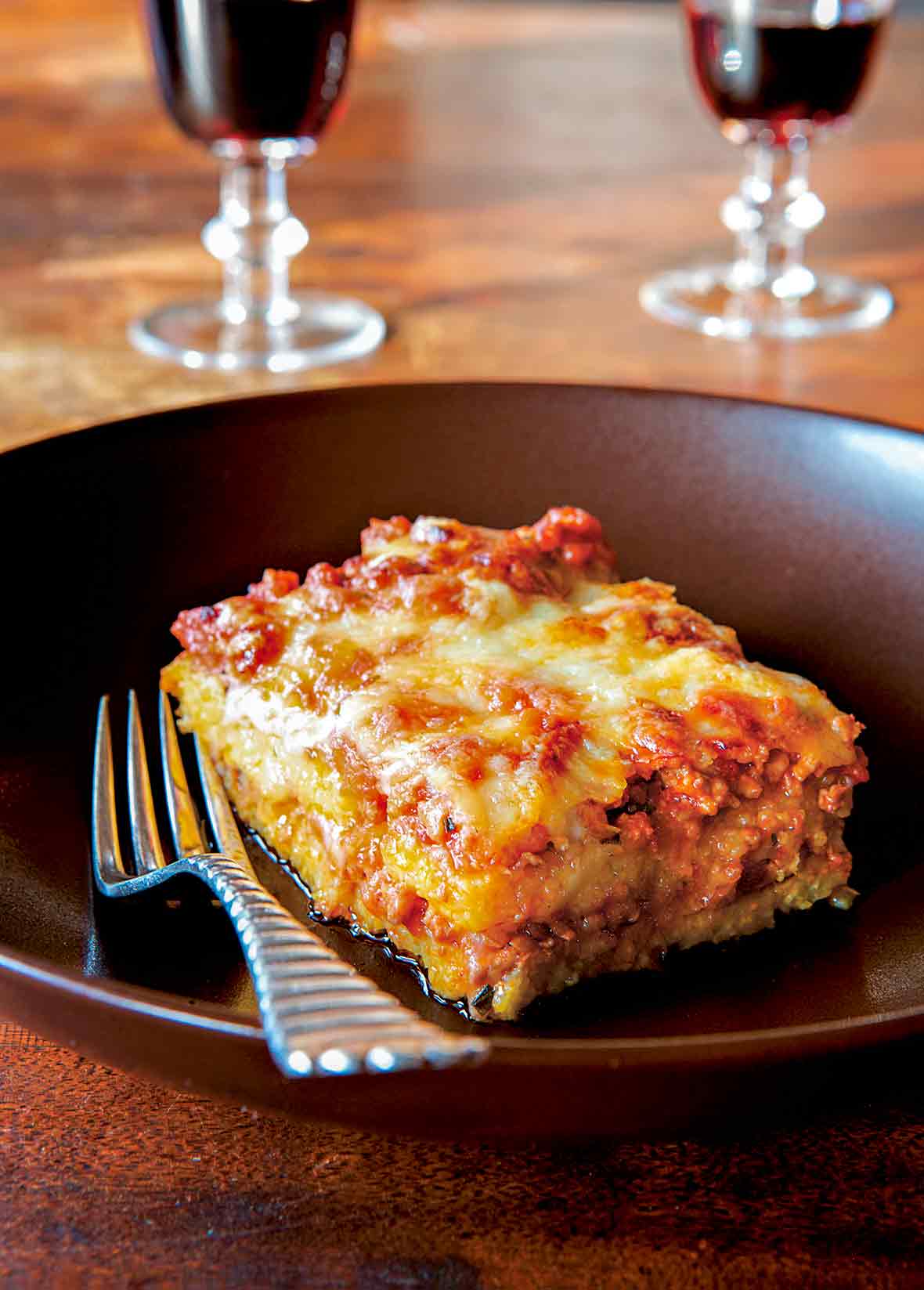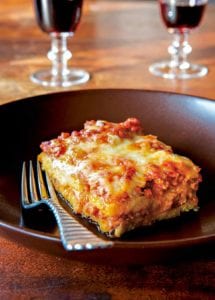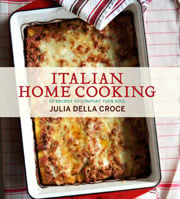
The polenta cake with meat sauce is much like baked lasagna except it’s polenta, not pasta, that’s smothered between layers of meat sauce simmered in wine and cheese. Brilliant, right?! It’s a traditional recipe from a provincial region in Italy known as pasticciata di polenta. While you could simply borrow inspiration from this lovely layering idea, relying instead on your own meat sauce, you’d be missing out by not trying this soulful recipe handed down through generations of the author’s family. –David Leite

Polenta Cake with Meat Sauce
Ingredients
- 6 tablespoons extra-virgin olive oil
- 1 onion, minced
- 1 carrot, chopped
- 1 small celery stalk, preferably with leaves, chopped
- 1 teaspoon ground fennel
- 1 pound ground pork, or a mix of ground pork and beef or Italian sausage
- 1/2 cup good-quality dry red wine
- 3 tablespoons store-bought or homemade tomato paste
- 36 ounces canned plum tomatoes, drained, seeded, and chopped, juices reserved
- 1 teaspoon sea salt, plus more to taste
- 3 tablespoons minced basil leaves
- Freshly ground black pepper to taste
- 1 Basic Polenta
- 1/2 pound semi-soft pecorino cheese, such as fior di sardegna or tuscan caciotta, or young Spanish manchego, shredded
- Olive or vegetable oil, for the baking dish and the work surface
Instructions
- Warm the oil in a skillet over medium heat. Stir in the onion, carrot, and celery and continue to sauté until softened, about 10 minutes.
- Add the fennel and pork, reduce the heat to medium-low, and sauté until the meat colors lightly, stirring occasionally, about 4 minutes. Stir in the wine and wait for it to evaporate. Add the tomato paste diluted in a little of the reserved tomato juices, then add the tomatoes along with another 1/2 cup of the reserved tomato juices and the salt. Cover partially and simmer over the lowest heat for 1 hour, stirring frequently, until the meat sauce is thick and fragrant. If the sauce seems to be drying out, add more tomato juices during cooking. Spoon off any fat that accumulates on the surface of the sauce. Then stir in the basil and season with salt and pepper to taste.
- Meanwhile, lightly oil a 9-by-13-inch baking dish. Turn the warm polenta out onto a lightly oiled baking sheet or work surface. Working very quickly, use a rubber spatula or knife dipped into hot water to spread it out into a rectangle about 1/4 inch thick. Let stand until cooled completely and firm, at least 15 minutes. Cut the polenta into 3-inch squares or strips of any length.
- Heat an oven to 450°F (232°C). Arrange half of the cake squares in the bottom of the baking dish. Pour half the meat sauce over the squares and spread to cover. Sprinkle half the cheese over the meat sauce. Repeat with another layer of each. Bake until the polenta cake is heated through and the cheese is golden brown, between 15 and 20 minutes. Let stand for 10 minutes. Cut into portions and serve.

Explore More with AI
Nutrition
Nutrition information is automatically calculated, so should only be used as an approximation.
Recipe Testers’ Reviews
Though I loved this recipe, I did have a few minor quibbles. The amount of salt in the filling is nowhere near enough; there should be a line in the procedure instructing the cook to “salt to taste.” Also, spreading the polenta in a 1/4-inch layer is not easy at all. Next time, I’ll let the polenta set in a loaf pan, then slice the loaf into 1/4-inch slices—much easier.
On to the good stuff—and there’s plenty of it. The recipe is a pleasure to make, filling your home with that wonderful aroma of cooking pork, tomato sauce, wine, and fennel—it screams southern Italy. I loved the hint of fennel because it wasn’t overpowering and worked so well with the basil and the delicious sheep’s cheese (I used a 6-month-old Manchego). The layers of polenta made this dish into a lovely comfort food. It was soft, but not mushy, and was a perfect fodder for the meat sauce. I’ll make this again, and the cookbook has been added to my Amazon wish list.
This recipe looked like real comfort food—and that’s exactly what it is! The meat was extremely tender after one hour of simmering. Since the polenta doesn’t absorb much liquid once it’s set, the sauce should be thick. Because of this, I found that it wasn’t necessary to add back the reserved tomato juices. The only thing I’d change for next time is to add heat, with some black pepper and red pepper flakes. Spicy Italian sausage might also be a good addition. All in all, this was a great dish for a cold Sunday afternoon.
First of all, this dish tastes great. The combination of the chunky sauce and the creamy polenta is terrific. Next time, I’d probably follow the suggestion of using half pork and half beef, since the pork by itself didn’t have as much flavor. My polenta never pulled away from the sides of the pan, but it still tasted great and set up nicely.
From the beginning, I thought this recipe would require some extra effort, but would result in a worthy dish. The ingredients were relatively easy to find at Whole Foods, except for the ground fennel seeds. I ended up grinding whole fennel seeds with a mortar and pestle. The recipe starts with comfortable steps: cooking the aromatics first and then browning the meat. The sauce thickened up nicely with the addition of tomatoes, tomato paste, and wine. After the sauce started cooking down, I left it simmering while I prepared the polenta.
The only step in the process that I was unsure about was the instruction to cut the polenta into 3-inch squares. The resulting dish would have been fine with squares of any size, or one continuous layer of polenta, because the dish was so easy to cut into and serve. The recipe ends by instructing the cook to “cut into portions,” so it didn’t seem like the 3-inch squares were for individual serving sizes.
In any case, I was very happy with the final dish. The salt level (mostly from the cheese) worked well with the pork sauce and polenta. The polenta was golden and creamy, but with a slight texture from the grains. The dish also reheated well as leftovers. The cheese flavors every bite, so this recipe would only work for someone who enjoys a strong, gamey cheese. I’d definitely think about cooking this dish again to be frozen or taken to a potluck.
This dish was a hit—it’s just perfect for Sunday dinner. While the ingredient list may look daunting, prep is minimal, and the recipe is very straightforward. I especially liked that while the meat sauce is simmering away, you can prepare and finish the polenta and shred the cheese. The star of this dish was the winey, rich meat sauce. The cheese was a close second—I used Manchego, which lent a certain je ne sais quoi to the polenta cake. The next time I make this dish, however, I’ll substitute lasagna noodles for the polenta. I found the polenta too filling, taking the spotlight away from the meat sauce and shredded cheese. I’m currently plotting other uses for this meat sauce.
This is great comfort food—my husband likened it to the Italian version of meatloaf and mashed potatoes. We made everything early in the day, then assembled and baked the dish after the football games. I also heated the sauce before layering it, so that it wouldn’t take longer to cook in the oven. The leftovers are wonderful. TIP: You can save some time by making the polenta while the sauce is cooking.
When I make this again, however, I’ll spice up the meat sauce with some red pepper flakes, and perhaps with an Italian spice mix. I also was surprised that the recipe called for fresh basil before the long simmer. I thought you’d want to add fresh herbs toward the end, to preserve their flavor. Another oddity: The recipe calls for a 35-ounce can of plum tomatoes. That’s a very odd size; I’ve never seen one.
This is a very interesting and different take on lasagna. The flavors are very basic, but delicious. It’s a bit involved as far as recipes go, but it’s definitely worth the effort. If I were making this again, I might buy pre-made polenta, because making your own adds to the cooking time. Alternatively, you could use other sauces, or doctor a pre-made sauce.














Delicious! Psychically rewarding!! Just the thing for a cold winter night in January!
Wonderful, Terry!
Looking forward to trying this but I thought I’d tell your tester, Cynthia D, that fennel seeds — all whole seeds, actually, can be ground to a fine consistency in a flash with an electric coffee grinder.
I have a small $20 or $30 Capresso model that I keep just for spices. It is soooo worth it if only to rub pork with freshly ground fennel.
Rainey, you’re so right, thank you for the reminder! And yes, pork and fennel is such a lovely combination. Have you ever tried fennel pollen that Zingerman’s sells? I haven’t but I’ve always been curious if it has a distinctly different flavor profile than ground fennel…
I actually have some fennel pollen that someone gave me for Christmas. I haven’t used it yet. It’s like fennel-lite with notes of celery leaf and licorice. At least that’s the best description I can come up with.
Lovely, that helps tremendously, thank you, as always, Rainey!
Please use your fennel pollen. I have used it for years. It is great on pork and wonderful in tomato sauces. It will remove the acidic taste in tomato sauces.
Thanks, Nancy.
If there is a variant of an Italian staple that is more Southern than grits and lasagna combined into one dreamboat of a kickasserole – I would love to see it. Standing O for this choice!